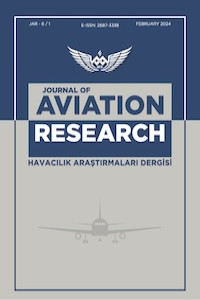Research Articles
Review Article
Systematic Reviews and Meta Analysis
4. Integrating Unmanned Aerial Vehicles in Airspace: A Systematic ReviewIssue Editorial Board





Aim & Scope
JAR adopts an open and free access principle and publishes original research articles spanning a wide range of topics with a focus on aviation research. JAR’s aim is to reach as many stakeholders as possible directly, to be a linking pin between academic research (both applied and theoretical) and the aviation industry, and to offer an online database for researchers. To that end, JAR welcomes applied and theoretical articles featuring quantitative, qualitative, or mixed-method studies. Authors could submit their manuscripts both in English and Turkish. JAR does not charge a fee for submission, processing or publication from authors.
JAR welcomes submissions across a wide range of topics that include but are not limited to the following
- Aviation management
- History of aviation
- Aviation education
- Aviation finance
- Aviation economics
- Aviation marketing
- Aviation law
- Organization and strategy for aviation
- Ground and cabin services in the aviation
- Human resources in aviation
- Safety systems in aviation
- Pilot training and licensing
- Aviation and data mining
- Information management in aviation
- Aviation physiology
- Aircraft maintenance
- Aircraft materials
- Aircraft systems
- Aircraft and helicopter aerodynamics of flight
- Structural designs
- Aircraft avionics systems
- Air traffic services and control
- Meteorology
- Military aviation
- Unmanned aircraft systems and drones
- Aviation and artificial intelligence
Author Guidelines
The manuscript that will be sent to the journal should be referenced in the APA 6.0 spelling rules and citation style.
Researches to be sent to the Journal of Aviation Research should be arranged according to the JAR article template.
1. Manuscripts sent to the journal should not have been published elsewhere or their copyrights given to third parties. Duplicate submission is unethical. Do not submit manuscripts that have been accepted or are under active consideration for publication elsewhere. Symposium papers which have not been published in book form can be published if this state is noted in the footnotes. Papers included in the proceedings can only be published with notable improvements and with a note stating this in the footnotes.
2. Manuscripts which do not comply with the writing rules, publishing principles or scientific research methodology are not considered for publication by the journal board. Authors receive one copy of the journal issue in which their work appears. Author(s) will not be paid for their published articles. Unpublished manuscripts are not returned to the authors.
3. Manuscripts submitted to the journal are sent to at least two referees. If one of the referees gives negative report about the submitted manuscript, it is sent to a third referee.
4. All scientific and legal responsibility for published articles belong to the authors. In a given issue, only one article by the same author (s) is published.
5. Manuscripts submitted for publication in the journal can be written in Turkish, English. Those written in Turkish should comply with Turkish Language Association’s rules of spelling and punctuation.
6. At the beginning of the manuscript there must be an English and Turkish abstract with 150-200 words and 3-5 keywords. The abstract should cover the purpose, scope, originality and contribution of the study as well as the methodology, main points, evaluations and recommendations.
7. The headings should either be in decimal number or alphabetical order. The following points should also apply: Main and secondary headings, titles of tables and figures should be bold and initials capitalized; in formatting tables and figures the journal’s font settings and page layout should be followed; figures and tables should be given a title and be consecutively numbered and aligned to the left margin; titles for tables should appear above tables and titles for figures should appear below figures; each equation should be numbered consecutively with equation numbers in parentheses flush with the right margin.
8. Manuscripts should be submitted as a Word document.
Ethical Principles and Publication Policy
Ethical Principles and Publishing Policy
Publication Ethics
Journal of Aviation Research (JAR) aims to produce, improve, and share knowledge objectively via scientific methods by examining the current improvements related to aerospace and aviation sector with a holistic and inclusive approach.
Scientific works are studies that are concluded as a result of scientific methods and which provide with the application of scientific methods and objectivity. In the process of production of these works, all the components of the publication process; namely, publisher, editor, author, reviewers, and readers must follow the ethical principles. In this scope, JAR must also follow the ethical principles of all components of the publication process in the light of the guides and policies published in the open access by the Committee on Publication Ethics, COPE (e.g. COPE “Code of Conduct and Best Practice Guidelines for Journal Editors”; ICMJE Recommendations, CSE White Paper on Publication Ethics, WAME resources, WMA policies, and ORI; WMA Helsinki Declaration).
In case manipulated, falsified and fabricated data is determined in the scientific studies which are sent and/or accepted by the journal, the institution(s) for which the author(s) works for will be informed and the study will be rejected. JAR has the right to ask for the documents related to the analysis results from the authors according to the feedback given by the editorial board and/or reviewers.
Research Ethics (ETHICAL CONSENT FORM)
In the scope of the protection of human and animal rights, the JAR adopts the exact convenience principle of national and international ethical rules and principles. In the articles evaluated in JAR, Research Ethics Committee Approval is needed for the following items:
• Researches conducted in qualitative or quantitative approaches which require data collection from the participants using survey, interview, focus group study, observation, and/or experiment techniques,
• Using humans or animals (including material/data) with experimental or other scientific aims,
• Clinical researches on humans,
• Researches on animals,
• Retrospective studies in accordance with the law on the protection of personal data.
Ethical Responsibilities of the Publisher
JAR is a personal journal having been published in the field of aviation field with the management of the publication board or editorial board since 2019. The journal publishers adopt the principle of free publishing without profit-making purposes in the light of publishing scientific studies with ethical principles.
• The publisher who is one of the stakeholders of the scientific study must act in the light of ethical principles.
• The publisher is responsible for using the communication ability without considering personal benefits and for leading the audience correctly.
• The publisher protects all the property rights and copyrights of the articles published in their journal; and assumes the task of archiving each product.
• Individuals must not abstain from contacting the publisher in case they come across an unethical situation.
Ethical Tasks and Responsibilities of the Editors
• Rejecting articles that are incompatible with the aim and scope of the journal.
• Considering the original value of the articles, their contribution to the field, the reliability, and validity of the research method, the clarity of expression, and the aim and scope of the journal.
• Evaluating the articles in the pre-assessment phase as long as there are no serious problems with the submitted articles; considering the suggestions of the Reviewers, not changing the decisions made by previous editor(s) as long as there are no serious problems, providing with constructive criticism.
• Applying double-blind peer review method and evaluation process policies adopted by the journal, keep the identity information of the reviewers confidential, providing with objective and timely evaluation for each article.
• In order to provide independent peer evaluation,
• In order to achieve peer evaluation independently, reviewers independent from the institutions of the authors are appointed.
• Sending articles for evaluation to the editors and reviewers considering their field of expertise and supporting objective and independent evaluation process.
• Acting in a balanced objective and fair way while the reviewers and editors do their duty without letting any discriminations against gender, religion or political belief or the ethnic or geographical roots of the authors.
• Evaluating the articles according to their content and favoring no authors in that sense.
• Taking necessary precautions and evaluating the presented declarations if any; in order to prevent possible conflicts of interest. In case there is a conflict of interest, Journal suspends the evaluation process of the article until the ambiguity is resolved; in this sense, Journal has the right to demand Research Ethics Committee Approval, Interviewer Consent Forms, and required documents.
• Evaluating sponsored articles or articles on special subjects in the same way as other articles.
• Applying required procedures by adhering to the policies and procedures of the journal in case there is a complaint about the ethical violation. Giving a chance to the authors in order to answer the complaint, and not avoiding applying required sanctions no matter to whom the article belongs to.
• Taking articles with negative conclusions into account.
• Acting responsibly and sensitively about publishing contents such as notice of correction, explanation, apology, and disclaimer.
Ethical Responsibilities of the Reviewers
A double-blind peer review is applied in the process of article evaluation in the JAR in which author(s) do not know reviewers and vice versa; Reviewers do not contact with authors directly; correction requests are forwarded to author(s) by the editors on the journal management system through article evaluation forms and notes on the original text.
Reviewers who are to evaluate articles submitted to JAR must carry the following ethical responsibilities:
• Reviewers must objectively evaluate only the content of the article in a timely manner and must accept articles only about their fields of expertise in order to contribute to the decision-making process of the Editor.
• Reviewers must carry out the evaluation objectively and in strict confidence. As per this principle, they must remove the articles that they have evaluated and must use them after they are published. Nationality, gender, religion, political belief, and commercial purposes must not be included in the evaluation process and must not ruin the objectivity.
• When reviewers conclude that there is a conflict of interest – common interest, they must inform the editor and reject evaluating the article.
• Reviewers must conclude evaluation in accordance with the academic etiquette with constructive and kind use of language and must avoid libelous and hostile personal comments.
• Reviewers must evaluate the article which they accept to evaluate in the given time.
• Reviewers must reject evaluating articles that resemble their own article in the writing process or in the evaluation process.
• Reviewers must protect the confidentiality of the information provided by the editor and author; as per confidentiality policy, they must remove the article after evaluation; if any, they must inform the editor about situations against bling judgment policy and reject the offer of evaluation.
• They must be aware of the potential conflicts of interest (financial, institutional, collaborative, or author-related or the relations among authors); and if necessary, they must warn the editor.
• They must continue to protect the confidentiality of the study and the evaluation process.
• In case there is a situation that can affect their original comments and feedbacks, they must inform the journal.
• They must try to reply to the demands coming from the journal about revision and re-evaluation.
Ethical Responsibilities of the Authors
The following are the scientific research ethical responsibilities of the author(s) who submitted an article to JAR:
• Author(s) must not submit their articles to JAR if the article was published in another journal or was submitted to another journal.
• Author(s) must send original articles to JAR.
• Author(s) must refer to the sources that they use during the production of the article appropriately in the light of ethical principles.
• The individuals who do not contribute to the article must not be included in the article as the author(s); changing the author order of the article or adding new authors or excluding an author must not be offered after submitting the article. During submission, the names of the authors must be uploaded to the system by the correspondent author. The Journal Editor Committee does not make any changes to the system.
• Author(s) must inform the editor about the individuals with a conflict of interest or common interests for the article that has been submitted.
• In case information about the article or raw data is requested from the authors during the evaluation process, the requested information must be provided by the author(s) to the editor.
• Author(s) must provide documents related to the rights to use data, the approvals related to the research-analyses or the consents of the participant who forms the study groups. Information concerning the voluntary participation consent form must be provided in the method part.
• Author(s) must contact the editors and edit or retrieve their content within five days when they realize that there is a problem with their article in the process of evaluation or in the preview process or published in the journal’s electronic environment.
• Author(s) must provide information regarding ethics committee approval of their articles which require quantitative or qualitative data collection such as experiment, survey, scale, interview, observation, focus group study with the name of the ethics committee name, decision date, and issue in the first and last pages and in the method part. They must also submit an ethics committee approval document to the system.
• Author(s) must provide evidence (obtaining permission for the use of documents such as scales, surveys, and photographs developed by others) that show they pay strict attention to the ethical principles in the process of data collection in the article. In the articles, it must be pointed out that copyright regulations were applied for the research and publication ethics and literary and artistic works. If the research is on humans and animals, it must be pointed out that the research was conducted in accordance with the international declarations, guides, etc. (Helsinki Declaration).
• No ethics committee approval is required for the review articles. However, authors must show that there is no requirement for ethics committee requirements in the first, the last, and the method part for the articles without ethics committee requirements.
Plagiarism Policy
Plagiarism is a common and serious ethical problem that affects scientific studies without considering if it is deliberate or not. Consequently, it is unethical and unacceptable as well as it is a crime to publish articles that have similarities with other sources and do not include references for them.
JAR takes various precautions to prevent any kind of plagiarism. Similarity Report Programs are used in order to determine the coinciding and similar text examples of the articles (after the acceptance of the articles). Articles with a similarity score of 10% and more are rejected even though they are accepted in the first place. Moreover, the publication board can act in accordance with COPE rules when encountered by plagiarism, reference manipulation, and data fraud claims and suspicions.
Conflict of Interest Policy and Copyright Regulation
• JAR is responsible for taking precautions in order to prevent potential conflicts of interest and for assessing the given declarations. Consequently, the journal thinks that potential conflicts of interest harm the scientific publication ethics. The journal defines all the responsibilities for all shareholders in order to determine and prevent conflicts of interest. In case of a potential conflict of interest, the Journal suspends the evaluation process of an article until the unclarity is eliminated. In this context, the Journal has the right to request Ethics Committee Approval, Interviewer Voluntary Consent Form and other documents to be submitted from the author that submits the article.
• Author(s) has the copyright of their own articles and the first-time publication right belongs to the JAR; as per Creative Commons Attribution principles, the article can be shared referring to the author and journal.
• Author(s) must submit the article with the signed version of the Copyright and Conflict of Interest Form (all the authors of an article must sign it) when they apply for article publication to JAR.
Publication Fee
JAR does not demand any charges for publication or publication cost from the author or the authors in any phase such as the submission, evaluation publication phases. Furthermore, no article processing charges are requested from the authors for their submitted articles. The journal is free-of-charge and 100% nonprofit in order to support publication in the field of aviation field DOI number from the moment the article is accepted and provides free access to the full text of the article.
Preview
The articles which are submitted to the JAR, accepted after the evaluation process, and completed process after the acceptance are presented with preview along with their DOI (Digital Object Identifier) numbers on the electronic environment in order to distribute the scientific information in an up-to-date manner. The articles which are published in the preview are published in an issue and voice with a page number approved by the editorial board and they are removed from the preview afterward. The articles in preview may not be the last version that will be published in the intended issue. Small changes may occur in the last version of the studies.
Reporting Situations Against Ethical Principles to the Journal Editor Board
In the JAR, editors, reviewers, authors must report the situations against Ethical Principles about the behaviors or the articles which are in the evaluation process, in preview or published using inaneryilmaz@gmail.com.
Policy Grounds
YÖK Bilimsel Araştırma ve Yayın Etiği Yönergesi (Boar of Higher Education Scientific Research and Publication Ethics Directions)
Committee on Publication Ethics (COPE)
World Medical Association (WMA) Declaration of Helsinki
International Committee of Medical Journal Editors (ICMJE)
Budapest Open Access Initiative
Creative Commons
Price Policy
Journal of Aviation Research (JAR)'da , makalelerin yayınlanması, okunması ve indirilmesi ücretsizdir, hiçbir işlem için ücret talep edilmemektedir. Aynı şekilde, hakem değerlendirme sürecinde de ücret alınmamaktadır.



